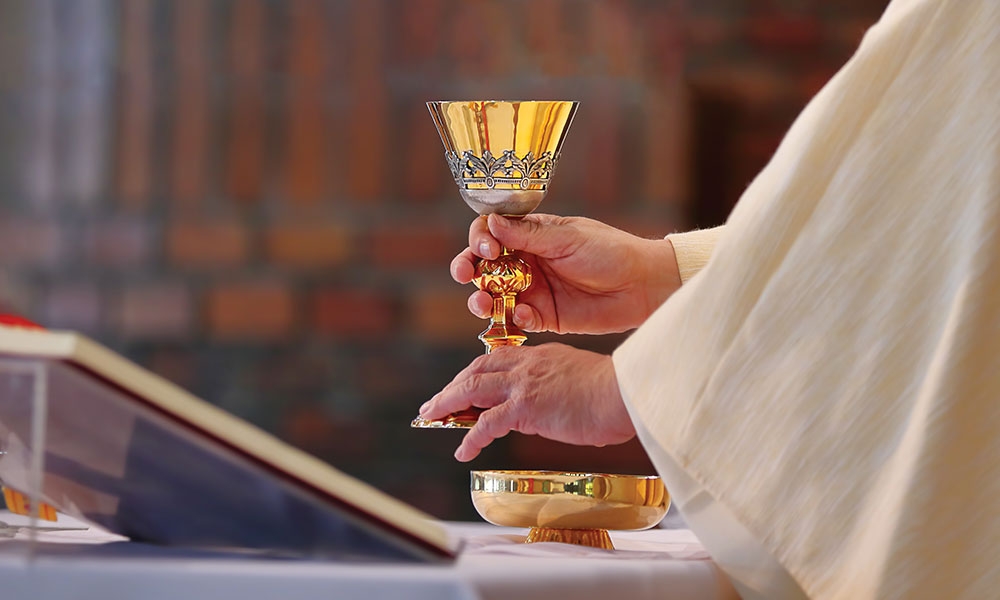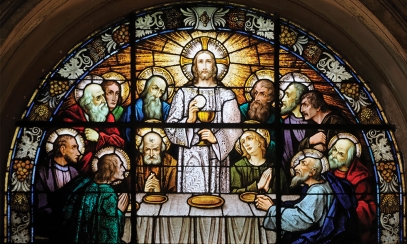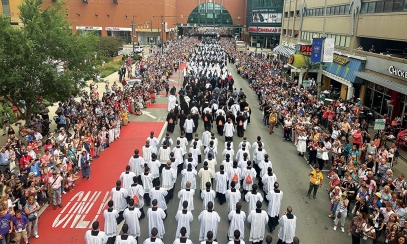
Worship fit for God
The Eucharistic Liturgy
The Eucharistic Liturgy
Inspired by the mission of the National Eucharistic Revival, this column presents an accessible catechesis on the Eucharist to help readers encounter Jesus in the Blessed Sacrament and become his faithful witnesses in the world.
From the pope to the Church’s most recent convert, the Eucharist holds a central place in our lives as Catholics. But many of us have never thought to ask why the Church considers the Mass so important. In giving us the sacred liturgy, God has given us a blueprint for worship – one that gives us access to the divine life and that corresponds to the deepest longings of our hearts.
Inspired by the mission of the National Eucharistic Revival, this column presents an accessible catechesis on the Eucharist to help readers encounter Jesus in the Blessed Sacrament and become his faithful witnesses in the world.
From the pope to the Church’s most recent convert, the Eucharist holds a central place in our lives as Catholics. But many of us have never thought to ask why the Church considers the Mass so important. In giving us the sacred liturgy, God has given us a blueprint for worship – one that gives us access to the divine life and that corresponds to the deepest longings of our hearts.
The human desire for worship
“You may find cities without walls, without literature, and without the arts and sciences of civilized life, but you will never find a city without priests and altars, or which does not have sacrifices offered to the gods.” — Plutarch, 2nd century BC
Two centuries before the birth of Christ, the Greek historian Plutarch recognized that human beings of every place and culture have a religious instinct – that is, they acknowledge the existence of a higher power. He also observed a near-universal inclination to worship “the gods” by means of sacrifice.
For today’s skeptics, humanity’s propensity for worship might be touted as proof that “God” is just a pipe dream invented to fill an interior lack. But the Church’s greatest minds throughout the ages have concluded exactly the opposite: The universal instinct to honor a higher power by sacrifice points to the fact that God has written into our hearts the basic blueprint for how he wishes us to relate to him. Even the fact that we are to carry out this worship through ritual is evident from our nature. We are not disembodied spirits, so what comes through our senses exteriorly affects our interior dispositions. Exterior rituals are meant to orient our hearts to God.
God calls us to worship
The Old and New Testaments bear witness to the People of God’s growing understanding of how God is to be worshipped. As God gradually reveals himself in salvation history, he invites us to honor him in ways that correspond to our natural human desire for worship.
The sacrifices of the Old Testament were prescribed by God to remind the Jewish people of their dependence on Divine Providence, to atone for sin and to point to the promised redeemer. These sacrifices foreshadow the perfect sacrifice of Jesus on the cross which brings God’s plan for our salvation to fulfillment.
A perpetual sacrifice
Although Jesus offered the perfect sacrifice once and for all on Calvary, the Catechism tells us that it “cannot remain only in the past.” Rather, “because ... all that he did and suffered ... participates in the divine eternity, [it] transcends all times while being made present in them all.” (1085) On the night before he died, Jesus instituted the holy Mass so that the graces which he won on the cross might be made present and applied to individual souls in every time and place. We make this same offering of the body and blood of Christ every time we gather around the Lord’s table.
God alone could have conceived of a means for us to offer, until the end of time, the sacrifice of Jesus on the cross. The Mass is the perpetual re-presentation (re-making present) in an unbloody manner of all that took place on the cross. On Calvary, Jesus was the priest who offered the sacrifice and was at the same time, the sacrifice offered; at Mass, the priest stands in the person of Christ and offers the body and blood of Jesus to the Father under the appearances of bread and wine. Thus, the sacrifice of the Mass and the sacrifice of Calvary are one and the same offering.
Sharing the fruits of the sacrifice
For many ancient peoples, the worship of God through sacrifice led to a communal meal in which all received a portion of what had been offered. Our Jewish ancestors in faith were commanded not only to sacrifice an unblemished lamb but to also eat its roasted flesh. Likewise, our participation in the sacrifice of the Mass is not complete without our sharing in holy Communion.
Before he directed his disciples to “Do this in memory of me” – that is, to offer the sacrifice of the Mass – Jesus gave the command to eat his flesh and drink his blood (cf. Jn 6:52). The Mass, therefore, not only fulfills the command to offer sacrifice; it is likewise the means by which we partake in the banquet of Christ’s body and blood.
What we discover in the Eucharistic Liturgy is that from the beginning, God has placed the desire for worship deep in our hearts as a means of drawing us to himself. Our response – of offering the sacrifice Christ himself taught us – adds nothing to God’s glory, but comes back to us as the inestimable gift of himself. We receive, in the Eucharist, the most sublime food which unites us to God and prepares us to join the saints in the eternal worship of God in heaven.


